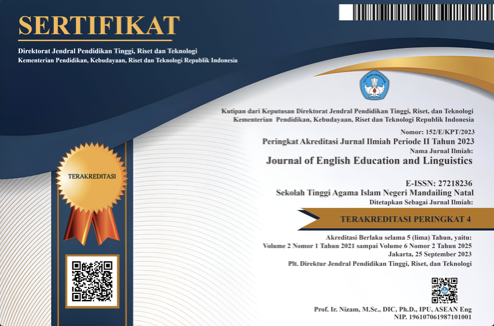WHATSAPP TO TEACH ENGLISH REMOTELY IN A LOW-TECH CLASS: TEACHER’S PERSPECTIVE
DOI:
https://doi.org/10.56874/jeel.v1i2.245Keywords:
low-tech class, perspective, WhatsAppAbstract
This study aims at addressing English teacher’s perspective about integrating WhatsApp (WA) into a university-level English class in STAIN Mandailing Natal. The data includes interviews with the teacher and observation on class postings in WA group and student-teacher timeline for four meetings. The data were analyzed qualitatively, and interpretively, resulting in three emerging themes about the WA to teach English remotely in low-tech classroom: the implementation of WA for online teaching, managing online learning activities in WA group and teacher’s constrains in applying WA in teaching online. The result of analysis indicates that WA is considered effective to teach English remotely in a limited internet connection classroom. With some adjustments to the instructional design, teaching and learning process could run well. However, due to the lack of students-teacher direct interaction, virtual class could not go as engaging as face-to-face learning in the classroom.
References
Alsaleem, B.I.A. (2014). The Effect of Whatsapp Electronic Dialogue Journaling on Improving Writing Vocabulary Word Choice And Voice of EFL Undergraduate Saudi Students. Arab World English Journal, 4(3), 213-225.
Cassanave, C.P. 2010. Taking risk? A Case Study of Three Doctoral Students Writing Qualitative Dissertations at an American University in Japan. Journal of Second Language Writing 19:1-16.
Chowdhury, A., Breznik, G., Verdnik, K., & Prihavec, B. (2012). Customer Identification and Authentication Procedure for Online Internet Payments Using Mobile Phone. Google Patents.
Dodgeson, Dave. 2020. WhatsApp and English Teaching-Learning. https://www.teachingenglish.org.uk/blogs/sakilandeswari/whatsapp-english-teaching- learning.
Hindu, H. (2011). Whatsapp Comes to The Rescue. Education Plus Journal, 3(3), 23-26. Lenhart, A., Madden, M., Smith, A., & Macgill, A. R. (2009). Teens and Social Media: An
Overview. Washington, DC: Pew Internet and American Life.
Milanovic, R. (2013). Building A Better Business Website: 10 Crucial Strategies for Turning
Your Online Presence Into Something Your Company Can Actually Use. Randy Milanovic.
Susilo, A. (2014). Exploring Facebook And Whatsapp As Supporting Social Network Applications For English Learning In Higher Education. Widyatama International Seminar (75).
Yeboah, J., & Ewur, G. D. (2014). The Impact of Whatsapp Messenger Usage On Students' Performance In Tertiary Institutions In Ghana. Journal of Education and Practice, 5(6), 157–164.
Downloads
Published
Issue
Section
License
All articles published in the Journal of English Education and Linguistics are licensed under a Creative Commons Attribution-ShareAlike 4.0 International (CC BY-SA) license. This means anyone is free to copy, transform, or redistribute articles for any lawful purpose in any medium, provided they give appropriate attribution to the original author(s) and Journal of English Education and Linguistics, link to the license, indicate if changes were made, and redistribute any derivative work under the same license.
Copyright on articles is retained by the respective author(s) without restrictions. A non-exclusive license is granted to the Journal of English Education and Linguistics to publish the article and identify itself as its original publisher, along with the commercial right to include the article in a hardcopy issue for sale to libraries and individuals.
Although the conditions of the Creative Commons Attribution-ShareAlike 4.0 International (CC BY-SA) license do not apply to authors (as the copyright holder of your article, you have no restrictions on your rights), by submitting to the Journal of English Education and Linguistics, authors recognize the rights of readers and must grant any third party the right to use their articles to the extent provided by the license.

This work is licensed under a Creative Commons Attribution-ShareAlike 4.0 International License.








